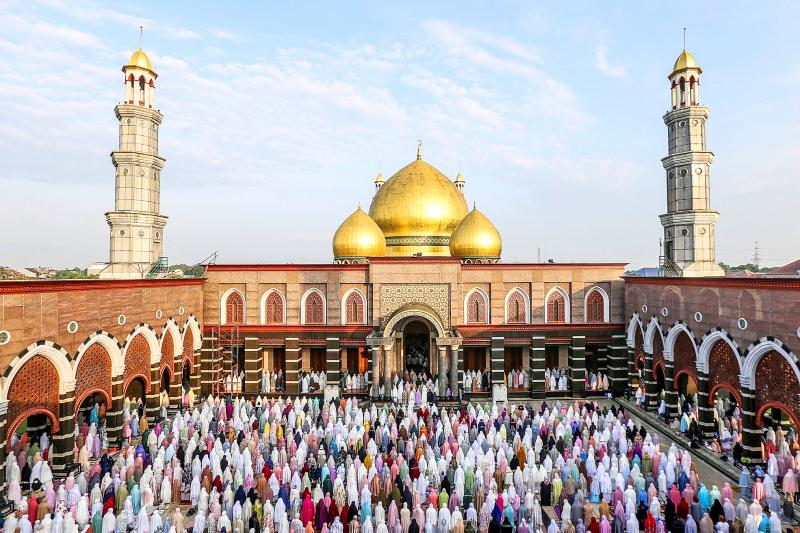Millions of Muslims in Indonesia yesterday returned home to properly celebrate Eid al-Fitr after two years of subdued festivities due to COVID-19 restrictions and travel curbs.
Eid al-Fitr marks the end of the Islamic holy month of Ramadan, when the faithful fast from dawn to dusk.
The return of the Eid tradition of homecoming has caused great excitement for people in the world’s most populous Muslim-majority country, as family gatherings and meet-ups with friends were on people’s lists while shoppers flocked to shopping centers despite surges in food prices.

Photo: Antara Foto / Asprilla Dwi Adha / via Reuters
In the past week, millions of Indonesians have crammed into trains, ferries, buses and — in greater numbers than ever — motorcycles, as they poured out of major cities to return to their villages to celebrate the holiday with families amid severe traffic congestion starting to occur on major thoroughfares across the country.
Flights were overbooked and anxious relatives weighed down with boxes of gifts formed long lines at bus stations for journeys that can take days.
The annual exodus tradition, known locally as “mudik,” returned this year after Indonesian President Joko Widodo surprisingly announced last month that the government decided to ease restrictions for the holiday festivities for the first time since they were banned two years ago due to COVID-19.
The country had largely recovered from a third wave of COVID-19 infections as a surge driven by the Omicron variant of SARS-CoV-2 peaked at about 64,700 daily cases in the middle of February. New daily infections had fallen to about 200 by this month, and about 80 percent of Indonesia’s eligible population of 208.2 million people had been fully vaccinated as of Sunday.
The government estimated that about 85 million travelers were expected to crisscross the vast archipelago that spans 17,000 islands for Eid al-Fitr this year, with about 14 million travelers departing from Jakarta’s greater metropolitan area. This is significantly higher than before the COVID-19 pandemic, when about 30 million people participated in the annual exodus tradition.
Worshipers wearing masks joined communal prayers shoulder-to-shoulder without physical distancing in the streets of Jakarta and in mosques across the city.
In Jakarta’s Istiqlal Grand Mosque, the largest in Southeast Asia, tens of thousands of Muslims attend prayers after authorities shuttered the mosque in 2020, when Islam’s holiest period coincided with the start of the pandemic. The Istiqlal mosque was totally closed during 2020 and last year remained closed for congregational prayers.
“Words can’t describe how happy I am today. After two years we were separated by pandemic, today we can do Eid prayer together again,” said Epi Tanjung, a Jakarta resident.
“Hopefully all of these will make us more faithful,” he said after worshiping with his wife at Jakarta’s al-Azhar Mosque where Muslims were seen embracing one another after prayers.

Airlines in Australia, Hong Kong, India, Malaysia and Singapore yesterday canceled flights to and from the Indonesian island of Bali, after a nearby volcano catapulted an ash tower into the sky. Australia’s Jetstar, Qantas and Virgin Australia all grounded flights after Mount Lewotobi Laki-Laki on Flores island spewed a 9km tower a day earlier. Malaysia Airlines, AirAsia, India’s IndiGo and Singapore’s Scoot also listed flights as canceled. “Volcanic ash poses a significant threat to safe operations of the aircraft in the vicinity of volcanic clouds,” AirAsia said as it announced several cancelations. Multiple eruptions from the 1,703m twin-peaked volcano in

Chinese President Xi Jinping (習近平) launched a week-long diplomatic blitz of South America on Thursday by inaugurating a massive deep-water port in Peru, a US$1.3 billion investment by Beijing as it seeks to expand trade and influence on the continent. With China’s demand for agricultural goods and metals from Latin America growing, Xi will participate in the APEC summit in Lima then head to the Group of 20 summit in Rio de Janeiro next week, where he will also make a state visit to Brazil. Xi and Peruvian President Dina Boluarte participated on Thursday by video link in the opening

China has built a land-based prototype nuclear reactor for a large surface warship, in the clearest sign yet Beijing is advancing toward producing the nation’s first nuclear-powered aircraft carrier, according to a new analysis of satellite imagery and Chinese government documents provided to The Associated Press. There have long been rumors that China is planning to build a nuclear-powered aircraft carrier, but the research by the Middlebury Institute of International Studies in California is the first to confirm it is working on a nuclear-powered propulsion system for a carrier-sized surface warship. Why is China’s pursuit of nuclear-powered carriers significant? China’s navy is already

IT’S A DEAL? Including the phrase ‘overlapping claims’ in a Chinese-Indonesian joint statement over the weekend puts Jakarta’s national interests at risk, critics say Indonesia yesterday said it does not recognize China’s claims over the South China Sea, despite signing a maritime development deal with Beijing, as some analysts warned the pact risked compromising its sovereign rights. Beijing has long clashed with Southeast Asian neighbors over the South China Sea, which it claims almost in its entirety, based on a “nine-dash line” on its maps that cuts into the exclusive economic zones (EEZ) of several countries. Joint agreements with China in the strategic waterway have been sensitive for years, with some nations wary of deals they fear could be interpreted as legitimizing Beijing’s vast claims. In 2016,